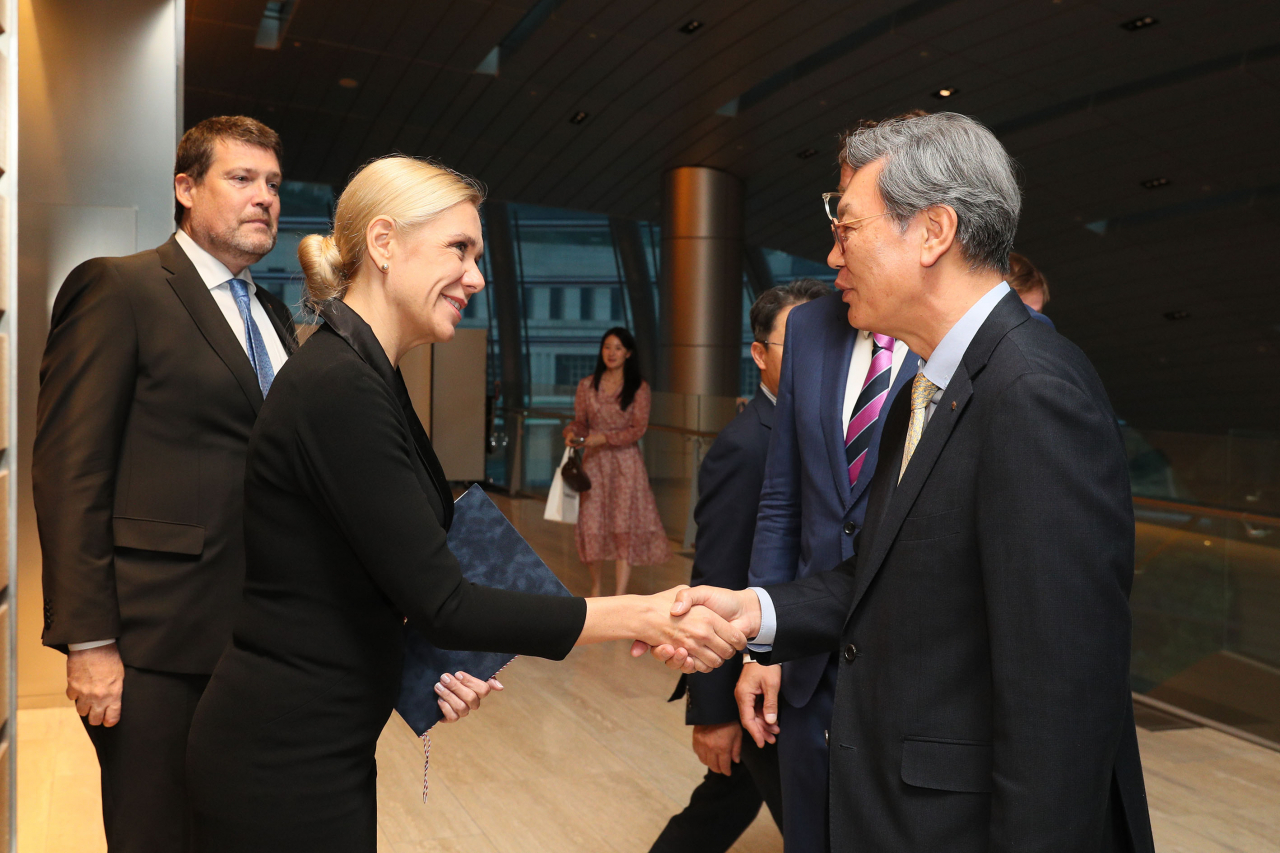 |
Slovak Deputy Prime Minister Denisa Sakova (second from left) shakes hands with Kim Chang-beom, vice chairman of the Federation of Korean Industries before holding a business roundtable at the FKI's headquarters in Seoul, Monday. (Yonhap) |
South Korean and Slovakian business leaders gathered in Seoul to deepen industrial cooperation, focusing on nuclear power plants and defense industries, according to a Korean business group on Monday.
On the occasion of Slovak Prime Minister Robert Fico's state visit to Korea, the Federation of Korean Industries hosted a roundtable with businesspeople from the two countries to discuss ways for Korean firms to expand their footings in the central European country.
Slovak Deputy Prime Minister Denisa Sakova, the State Secretary of the Ministry of Foreign Affairs and European Affairs of the Slovak Republic Rastislav Chovanec and Slovak Ambassador to Korea Marek Repovsky took part in the event.
Sakova highlighted that Slovakia is an attractive destination for long-term investments, providing vast opportunities for value-added businesses thanks to the country’s affluent natural and tourism resources.
From the Korean side,about 20 business leaders from various industries, including automobiles, electronics, nuclear power plants, the defense industry and robots were in attendance.
“I hope that Korea and Slovakia will extend their win-win relationship in existing industries such as electronics and automobiles to new areas like nuclear power plants, defense industry and high-tech industries as well,” FKI Vice Chairman Kim Chang-beom said.
Last year the volume of trade between the two countries was $4 billion, and it continues to grow every year. As of March, Korea's investment in Slovakia amounted to $1.58 billion, while 143 Korean companies are advancing into the market, centering on the automotive and home appliance sectors
Attending Korean business leaders called on the Slovakian government to strengthen tax incentives and cut red tape for foreign investments.
They showed a particular interest in the Slovakian government’s plan to build a new nuclear reactor with a capacity of up to 1.2 gigawatts at the Jaslovske Bohunice site set to break ground in 2031.
There were inquiries about the progress and plan for selecting a new nuclear power plant operator and the government plans for introducing small modular reactors as well as plans to secure financing for the construction of a new nuclear power plant.
Korean enterprises expressed their hope to participate in the Slovakian military modernization project and have detailed discussions with the Slovakia’s Defense Ministry.
Regarding the automobile industry, there were requests to improve infrastructure around new investment sites. In particular, suggestions were raised for constructing a new road connecting the new factory construction site and building infrastructure to resolve traffic congestion and logistics delays during commuting.
According to a recent report by the Korea International Trade Association, Slovakia is emerging as a European high-tech industrial base, along with other central European peers the Czech Republic, Hungary and Poland, collectively known as the Visegrad Four.
The four countries have led economic growth through automobiles and electronic device manufacturing and are fostering high value-added industries following the COVID-19 pandemic, offering export opportunities for Korea's new growth industries.
KITA selected seven promising industries to target the four European markets -- biohealth, robots, new energy industry, next-generation semiconductors, aerospace, electric vehicles and automobile parts.
“The relations between Korea and the Visegrad Four is being upgraded beyond economic cooperation centered on manufacturing to a strategic partnership in comprehensive areas such as nuclear power plants, joint development of weapons systems, supply chain stabilization and regional security,” said Hong Ji-sang, a senior researcher at the KITA.







